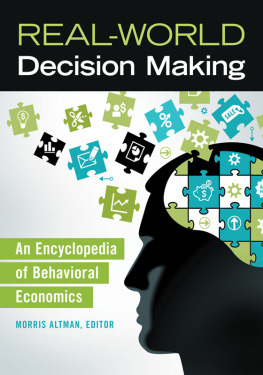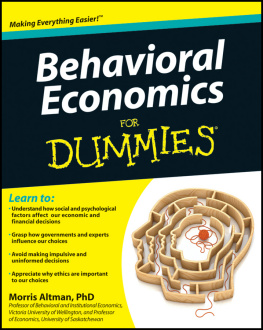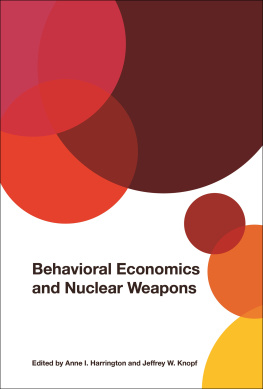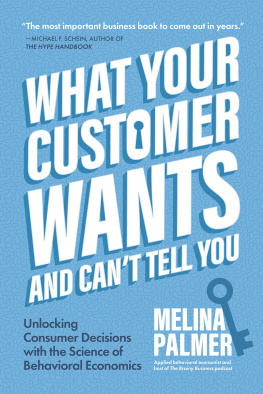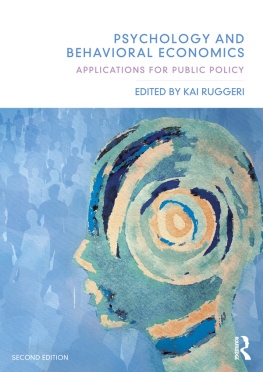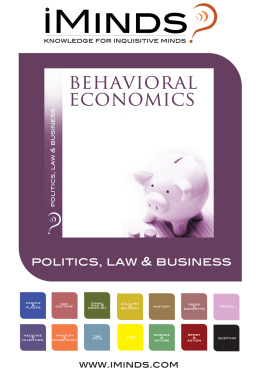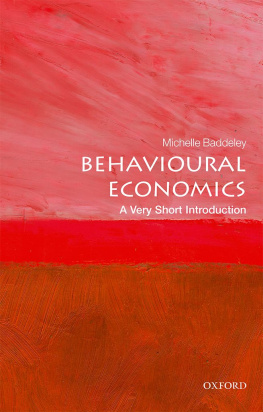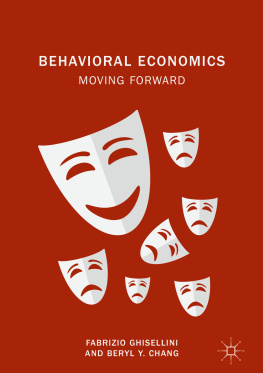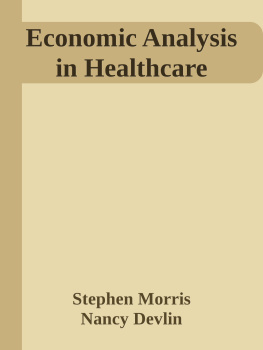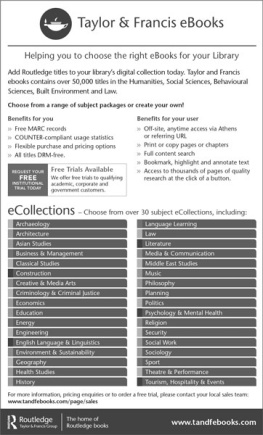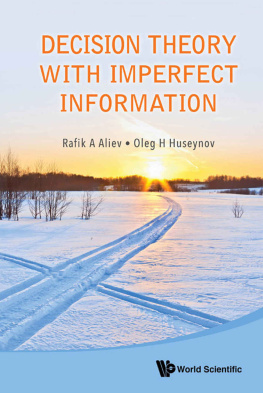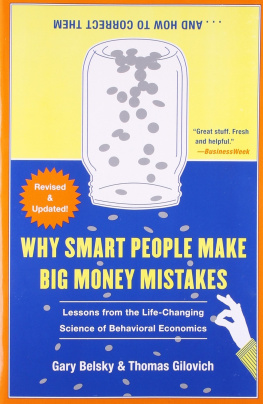Real-World Decision Making
An Encyclopedia of Behavioral Economics
MORRIS ALTMAN, EDITOR

Copyright 2015 by ABC-CLIO, LLC
All rights reserved. No part of this publication may be reproduced, stored in a retrieval system, or transmitted, in any form or by any means, electronic, mechanical, photocopying, recording, or otherwise, except for the inclusion of brief quotations in a review, without prior permission in writing from the publisher.
Library of Congress Cataloging-in-Publication Data
Real-world decision making : an encyclopedia of behavioral economics / Morris Altman, editor.
pages cm
Includes bibliographical references.
ISBN 978-1-4408-2815-7 (print : alk. paper) ISBN 978-1-4408-2816-4 (e-book)
1. EconomicsPsychological aspects. I. Altman, Morris.
HB74.P8R327 2015
330.01'9dc23 2014049275
ISBN: 978-1-4408-2815-7
EISBN: 978-1-4408-2816-4
19 18 17 16 15 1 2 3 4 5
This book is also available on the World Wide Web as an eBook.
Visit www.abc-clio.com for details.
Greenwood
An Imprint of ABC-CLIO, LLC
ABC-CLIO, LLC
130 Cremona Drive, P.O. Box 1911
Santa Barbara, California 93116-1911
This book is printed on acid-free paper 
Manufactured in the United States of America
Contents
The main point of this encyclopedia is to provide a comprehensive set of definitions and explanations of key concepts in behavioral economics provided by respected researchers. Written by those who are publishing in the field, the encyclopedia entries are rigorous, timely, and up-to-date. For those interested in the increasingly important area of behavioral economics and the related fields of economic psychology, and institutional, evolutionary, and experimental economics, this volume provides conceptual clarifications and insights. Moreover, the various entries are largely written in plain English to be easily understandable to scholars from across the disciplinary divide, students at different stages of their education, as well to public policy experts, journalists, politicians, and members of the general public. All entries include references for those interested in venturing further into the realm of behavioral economics.
This encyclopedia project originated initially with a really bright idea from Brian Romer, formerly Senior Acquisitions Editor, Business and Economics, ABC-CLIO Greenwood-Praeger. Mark Pingle of the University of Nevada, Reno, introduced me to this project. Mark also contributed suggestions and entries to this encyclopedia. Many thanks to Hilary Claggett, Senior Editor, Business, Economics and Finance with ABC-CLIO, for her wonderful editorial work. This volume would not have been produced without the efforts of its many contributors. Making the most significant contributions in terms of entries and suggestions were: Gerritt Antonides, Pablo Braas-Garza, Roger Frantz, Hamid Hosseini, Erich Kirchler, Matthias Klaes, Doron Kliger, Leslie Marsh, Andreas Ortmann, Robert Oxoby, and Mark Pingle. I also thank my wife, Louise Lamontagne, and my daughter, Hannah Altman, who both contributed entries to the encyclopedia, and from whom I always draw inspiration and support.
Morris Altman
Behavioral economics has become almost a household word among the literate public. It is often posed as an alternative to traditional economics. And it is also often directly associated with the view that people tend to be irrational and error-prone and that markets cant fix such problematic behaviors. In this case, individuals need to be nudged or instructed into changing their behaviors. This would be opposed to what many consider to be the face of traditional economics: that individuals tend to be rational in making decisions that are good for themselves and even for society at large. And, when this is not the case, market forces would be expected to fix the problem pretty quickly; fast enough so that problematic behavior need not be of much concern to the analyst or public policy expert. This stark dichotomy between behavioral and traditional economics makes for a good read, but is often highly misleading and all too often distorts both behavioral and traditional economics.
The approach taken in this encyclopedia is that traditional economics provides us with a pretty good toolkit to engage in economic analysis. Behavioral economics, in its different and sometimes competing configurations, serves to enrich the economic toolbox. For example, price theory (how absolute prices, relative prices, changes in these prices, and income affect decision making), which is core to traditional economics, is not tossed out of the economics toolbox. Its importance is recognized, as are the limitations of the traditional toolkit. Introducing behavioral variables into the analytical mix enhances price theorys explanatory power. However, behavioral economics often challenges long-held views on how and when some of the traditional tools should be used, and if even if they should be used at all. Behavioral economics is viewed here as very much part of the economics discipline. It is a critical component of the economics toolbox. In contrast to traditional economics, it is much more informed by interdisciplinary discourse. Moreover, in this volume terms and concepts of various strands of behavioral economics are introduced and elaborated upon. These are also linked, where possible, to traditional economic terms and concepts, to place behavioral economics in the context of the broader economics discipline. The approach taken in this book is explicitly pluralisticdifferent and competing perspectives in behavioral economics are given due consideration. The reader can then evaluate and compare approaches and place these in the context of the various tools available in the traditional economics toolbox.
Behavioral economics as a discipline and as a set of methodological tools first became of increasing importance in the social sciences through the contributions of Herbert Simon with his development of the concepts of bounded rationality, procedural rationality, and satisficing, which he posited as alternatives to the traditional economics concepts of unbounded rationality, and maximizing and minimizing. Simon was at the forefront of what has been referred to the Carnegie-Mellon school of behavioral economics, which included leading social scientists, such as Richard Cyert and James March. Simon argued that many of the traditional assumptions about decision making were flat-out wrong, generating models yielding poor understandings and causal analyses, and even poor predictions pertaining to economic behavior and economic outcomes. Also, he argued, these models are built upon assumptions that are not only simplifying (which they must be) but simplistic, with little or no relationship with the reality of real-world decision making. A key aspect of behavioral economics, at least from the perspective of the Carnegie-Mellon school, is that critical to rigorous and profound analyses is the assumptions one makes about how individuals engage in decision making and about the social and overall institutional environment within which decisions are made. Others have discussed these issues before Simon and his colleagues, but not as systematically and rigorously.
Thorstein Veblen, John R. Commons (whom Simon held in high regard), John Maynard Keynes, and George Katona are among those whose arguments and theorizing were imbued with the notion that the realism of assumptions matters, be they of a psychological, sociological, or institutional bent. Moreover, for them, economics should not be simply about price theory because this cant explain key phenomena in the economics realm. Thorstein Veblen hypothesized about how noneconomic variables impacted decision making and economic outcomes, famously giving rise to the concept of conspicuous consumption and shareholder wealth maximization as a critical component of the firm decision makers preferences or preference function (in place of profit maximization). Commons introduced the importance of institutions and embedded power relationships to better understand decision-making and economic outcomes. Keynes introduced a variety of psychological and sociological factors to better understand decision making and economic outcomes, especially business cycle and share price behavior. A classic concept that he paid especial attention to was animal spirits, the idea that how people feel about the present and future, even if feelings are not entirely objectively or scientifically determined, have a large impact on decisions and outcomes, thereby having an impact on the real economy. Katona integrated into his analysis consumer confidence, related to the concept of animal spirits. Consumer confidence can affect real economic variables and can determine the extent and timing of the business cycle. And his modeling easily outperformed the conventional or traditional economic models. Even much earlier on, Adam Smith, author of The Wealth of Nations , John Stuart Mill, and Alfred Marshall, core to the origins of contemporary economics, informed their modeling with some understanding of how and why decisions were madethe realism of their modeling assumptions was of some consequence.
Next page
